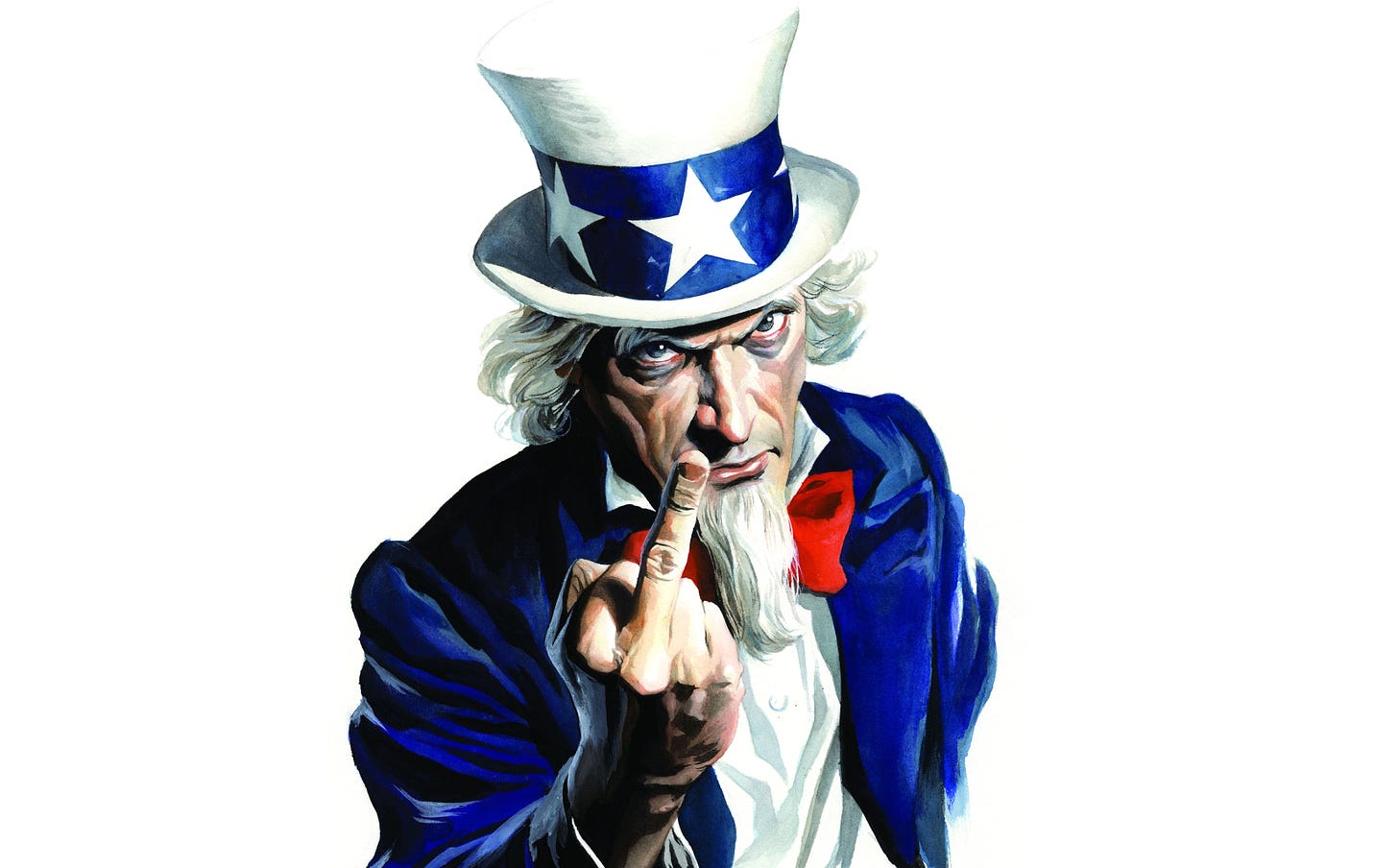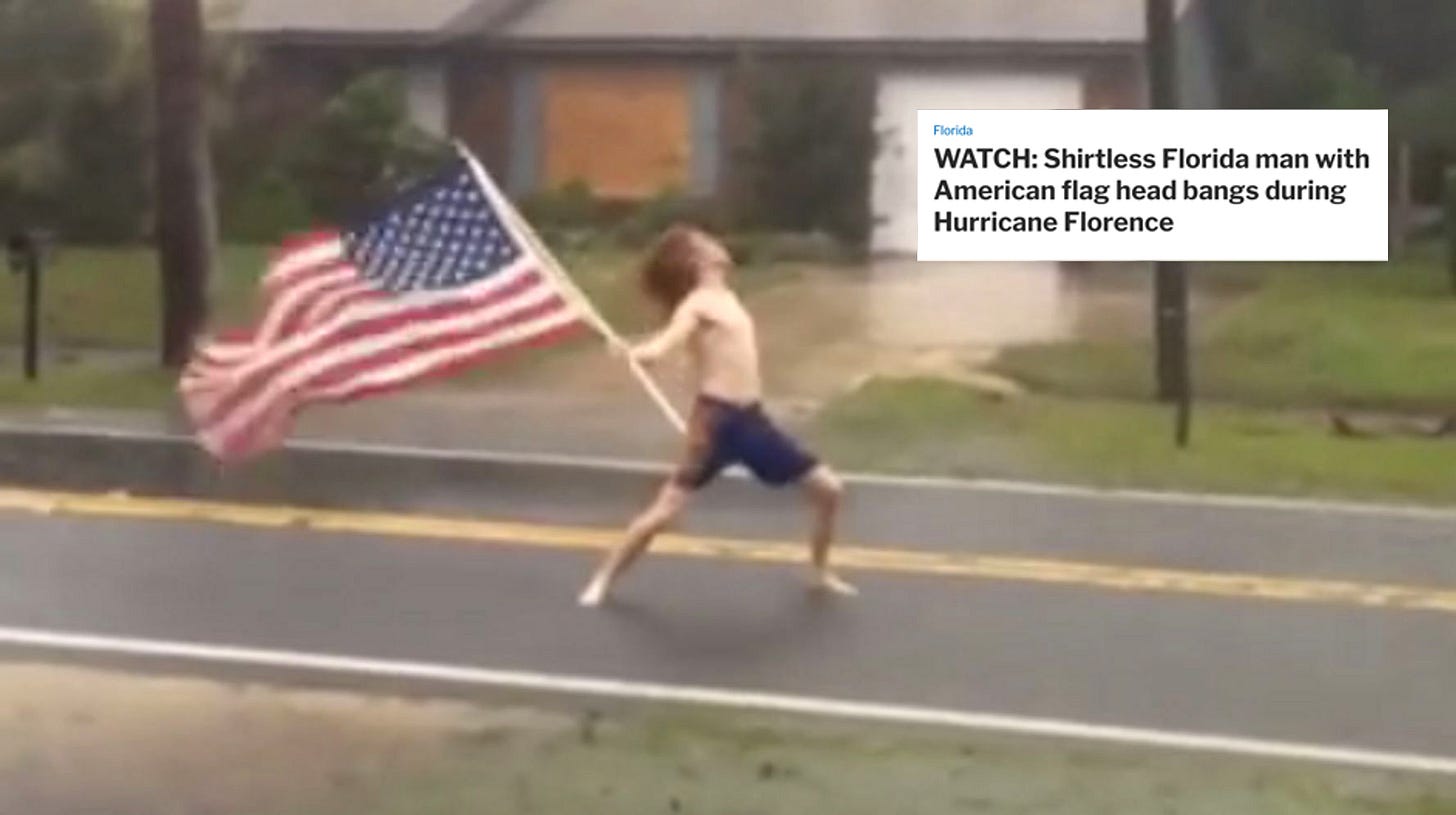
This week’s article is a guest post by Timothy Wood.
You can now read American Dreaming in the new Substack app for iPhone. You can join the Android waitlist here.
If you pay for something, it’s yours, right? Wrong. We finance lots of people making lots of things and we own almost none of it. These folks work for our state governments, and even though we footed the bill, the materials they make don’t belong to us. It’s normally a rather straightforward concept. I bought this sandwich. This sandwich is mine. But what you own is a sandwich, and not the sandwich. As it happens, the sandwich is a legal entity that exists outside the confines of your bread.
In fact, this issue was quite literally brought before the First Circuit Court of Appeals in 2015. Norberto Colón Lorenzana and Gladys Goza González claimed that they owned not merely a chicken sandwich, but the chicken sandwich, specifically the Pechu Sandwich that they developed while working for Church's Chicken in Puerto Rico. Per the court filing, the sandwich was a hit, and Church's promptly filed for a trademark of both the name and the recipe. The plaintiffs argued that their sandwich was a creative work, and therefore protected. The court disagreed, stating, in an amazing turn of sophisticated legal theory, that “A chicken sandwich is not eligible for copyright.”
So we’ve got two related concepts butting up against one another here. Trademarks can be nearly anything. It is a mark of your trade. It is the part of the law that prevents others from using your reputation as a business to sell something not related to you. Take the Nike swoosh. The Nike spokesperson on the commercial may tell you to “Just do it” — that is, so long as “it” doesn’t entail violating their trademark. If you start making your own shoes with swoosh-like logos on the side, you’re liable to find yourself in court.
Copyright, by contrast, specifically protects original creative works. In most circumstances, it’s ethereally invoked the moment a creative work is made. That crappy drawing junior made of your dog and a tree? Yeah. Little Timmy legally owns that as his original creative work. If somebody decided to make it into a shirt and sell it online, he’s probably got a valid copyright claim.
This has its limits, though. You can’t copyright a building meant for human inhabitants, for example, no matter how creative it is (see also Gaylord v. United States and the curious case of The Vessel in New York City). Notwithstanding mind-numbing arguments over minimalist art, the thing you claim copyright over must have substance. It has to rise to the level of being an original creative work. It must also be published, though the definition of “publish” turns out to be quite flexible.
But just as you can own a sandwich, you can own many copies of something without owning the idea itself. That Stones record you’ve got sitting on the shelf? What you actually own is a physical item with a limited license for private exhibition, not for commercial purposes. On top of that is the copyright for the writing, the arrangement, and that particular performance, as opposed to any other recording. If you happen to use it in any way that generates money, then Mick Jagger and Keith Richards are owed their cut, because you own a thing, but they own the thing. Just ask Taylor Swift, who decided to re-record her albums because she owns the rights to the songs, but not to the tracks.
In a stroke of genius, the US Federal Government in the Copyright Act of 1909 saw fit to declare that if taxpayer-funded public servants make something in service of the public, then the public owns it. This isn’t terribly out-of-step with many instances of a fee-for-service model. If I pay you to make it, then I own your work as part of our contract. These works by US federal employees are in the public domain. You can use them for any purpose. You can remix, remake, and refit them in any way you want. But this principle only goes so far.
Most states and local jurisdictions in the US retain the intellectual property rights of the official works made by public servants in the course of their duties. You paid for them — and not just for a copy, but for their creation — yet you don’t own them. They belong to the government, and they’ll sue you if you use or treat them as yours.
This is absurd.
We live in a world of mashing and mixing, where any teenager with a $300 laptop can take something old and make something new. Most importantly, we paid for this shit. We elected these people. They work for us. So why is it that the stuff they make while serving us is somehow not ours? It gets even weirder, because these products don’t belong to the employees who created them, either. They belong to their employer — the government. Neither the payer nor the creator owns these works. They belong instead to an abstract entity. Ideas owned by other ideas.
Millions of state and locally produced images, recordings, videos, documents, diagrams, presentations, and productions. Reams upon reams of materials that we commissioned, but will be sued if we use. Enough. All publicly funded creative works should be public domain. No exceptions. We paid for them. We own them. The public domain is our domain.
Most people probably don’t think about it, because whether you realize it or not, that clever Spongebob meme you posted on Facebook is covered under what’s called fair use. In essence, if you’re not costing anybody serious money, the law protects you for violating copyright just a teensy bit, and especially if you’re using it for critical commentary. That’s why your favorite YouTuber can make a quick gag using a short clip from The Simpsons, even though they clearly don’t own the footage themselves.
If you want to see free government creations in action, spend some time browsing DVIDS, the US Department of Defense media repository. It’s a gargantuan collection of media — and it’s all free. It belongs to everyone and no one. You can use as much as you want. You can make money off it. You don’t even have to give them credit for the work. It’s truly, truly free, because you already paid for it.
This brings us, as all important discussions eventually do, to our most beloved American mascot: Florida Man. It turns out that Florida Man isn’t a meme because people in Florida are particularly… Floridian, but because Section 24 of the Florida Constitution releases all works of any state government agency, and all subordinate agencies, for free use to the public. Unlike most other states, Florida doesn’t only release snippets of police press statements for high profile cases. Rather, all of the original documents for cases big and small are accessible. This means we can all share in glorious mirth when a Florida man becomes trapped in an unlocked closet for two days, or tries to evade arrest by cartwheeling away, or is arrested for repeatedly calling 911 because a strip club wouldn’t admit his kitten. (Though to be fair, it seems doubtful the kitten was of legal age to enter the establishment, and probably didn’t have a valid photo ID.)
If a Florida state employee snaps a picture in the Cypress Creek Wildlife Management Area, that picture is yours. You can do whatever you want with it, completely free of any copyright limitations. However, if one inch over the state border, a Georgia state employee photographs the same scene, that image is owned by Atlanta, and they can absolutely sue your ass into oblivion if that’s the one you use as your book cover.
As one of many volunteers and activists, I sat in a room with Google and Facebook at a 2018 conference in Boston dedicated to advancing public access to knowledge. I begged them, just make more stuff free. You guys are big — you don’t write a letter to your congressman; you have their cell on speed dial. Having the entirety of the world and human history at our fingertips is built on a latticework of free. The single biggest step we can take to strengthen that is to make public works free to the public. It’s simply the largest pool of content with a clear path for release.
If anything came of my pleading, I haven’t seen it. These companies have had no shortage of time before Congress. We haven’t exactly seen the likes of Zuckerberg throwing the weight of Facebook behind an expansion of public domain.
At the end of the day, we’re being robbed. Robbed not only of millions of dollars in intellectual property, and original source documents that increase transparency and help us hold our elected officials accountable. We’re being robbed of the really important stuff. We’re denied Louisiana Man, who tried to hold up a liquor store with a weaponized baby alligator. We’ll never know the joys of Virginia Man, who tried to fight a swan with a trademarked chicken sandwich, or Oklahoma Man, whose driver’s license was suspended for riding a steer on the interstate under the influence of crystal meth. Sadly, we must content ourselves with Florida Man, because his state has sensible copyright laws.
We need protections for intellectual property. It’s what enables the creators you love to keep making the content you enjoy, from music stars to instructional videos on changing a tire. But the government shouldn’t be one of them. They don’t need to pay the bills by hoarding the rights to creative works. You don’t need to like and subscribe to a map drawn by the county or a survey published by your state. It should be yours, but it probably isn’t, and we need to change that.
See also: “Is Our Children Learning?”
Subscribe now and never miss a new post. You can also support the work on Patreon. Please consider sharing this on your social networks. You can reach me at @AmericnDreaming on Twitter, or at AmericanDreaming08@Gmail.com.







